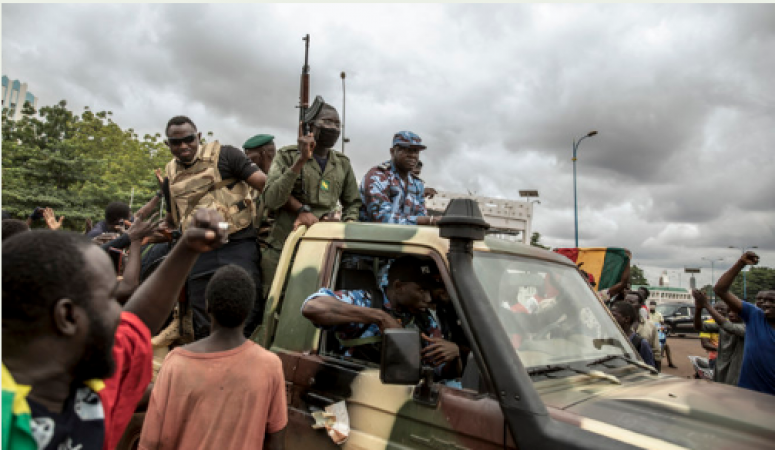
UNO: The United States demanded that Afghanistan's Taliban leaders deny safe haven to terrorist organisations like Al-Qaeda and the Daesh following Friday's string of military coups in the Sahel region of Africa.
At a UN Security Council meeting, US Ambassador Linda Thomas-Greenfield stated that the US is focused on the growing terrorism threat in Africa and that it is still giving its African partners "critical assistance in disrupting and degrading" Daesh and Al-Qaeda affiliates.
The long-anticipated council meeting on counterterrorism took place days after Yevgeny Progozhin, the head of Russia's Wagner Group, and several of his close friends were reportedly killed in a plane crash shortly after taking off from Moscow. They had recently returned from Africa, where military-ruled Mali and Burkina Faso, which are facing growing terrorist threats, are active with Wagner mercenaries.
Also Read: Trump's mug shot merchandise is embraced by a divided America
In light of Prigozhin's passing and the uncertainty surrounding the future of Wagner's African operations, Thomas-Greenfield was questioned following the council meeting about what the West ought to do to calm the situation in those nations as well as other ones in Africa where Wagner is active, including Libya.
The US ambassador said: "Our position on Wagner is very well known. We have no further comment on Prigozhin. They are causing instability in Africa with their activities, and we have urged African nations to denounce both their presence and their behaviour.
Vladimir Voronkov, head of the UN's counterterrorism department, reiterated in his briefing to the council that the threat posed by Daesh, also known by its Arabic acronym Daesh, poses "a serious threat in conflict zones and neighbouring countries."
"In some parts of Africa, the continued expansion of Daesh and affiliated groups, as well as the increasing level of violence and threat, remain deeply concerning," the official said.
Also Read: Ukrainian Forces Target Russian Military Base in Annexed Crimea, Escalating Tensions
The Sahel region's Daesh affiliate, according to Voronkov, "is becoming increasingly autonomous and increasing attacks" in Mali, Burkina Faso, and Niger, where the presidential guard kidnapped the elected president and his family in July.
The conflict between this group and an Al-Qaeda affiliate in the area, along with the hazy circumstances following the coup in the Niger, present a complicated and multifaceted challenge, according to Voronkov. He claimed that alongside their ongoing battles with government forces, terrorist and armed group attacks in the Democratic Republic of the Congo have grown. He claimed that 500 people had died as a result of terrorist violence in the volatile east of the nation.
According to Voronkov, the conflict in Sudan, which erupted in the middle of April, has brought attention back to "the presence and activity of Daesh and other terrorist groups in that country."
Beyond Africa, he claimed that Afghanistan's situation "is growing increasingly complex" due to terrorists obtaining weapons and ammunition. "With the group becoming more sophisticated in its attacks against the Taliban and international targets," he said, "the group's operational capabilities have reportedly increased."
Additionally, Voronkov cautioned that the presence of about 20 terrorist organisations in Afghanistan, along with the Taliban's oppressive policies, the lack of development, "and a dire humanitarian situation," "pose significant challenges for the region and beyond."
Maria Zabolotskaya, the deputy ambassador of Russia, charged that "the West's collective intervention in the affairs of sovereign developing countries" and their "destructive role" were to blame for the rise of terrorism. She asserted that the West pillaged these nations' natural resources and only offered mediocre public administration and economic growth.
She claimed that despite spending more than 20 years in Afghanistan "under the pretext of fighting terrorists," foreign forces led by the United States left without decimating Al-Qaeda while also leaving behind a sizable amount of military hardware. As a result, she continued, "Western weapons that were imported into the country to fight terrorism ended up, among other places, in the hands of the terrorists themselves."
Zabolotskaya asserted that the NATO-supported uprising in Libya, which overthrew and killed longtime dictator Muammar Qaddafi in 2011 and threw the nation into anarchy, was the cause of the Daesh's appearance in Africa.
Also Read: The family of an Iranian-German detained in Iran is met by a US envoy
The size of the Daesh group's emergence in the Middle East, she added, was "a direct result of the aggression of the United States and their coalition against Iraq" in March 2003. She claimed that while Daesh has been largely vanquished in Iraq and Syria, "pockets of terrorist activity remain in areas that the US military has illegally occupied."
According to a report released by the UN on August 14, the Daesh organisation still has between 5,000 and 7,000 members spread across its former stronghold in Syria and Iraq, and its fighters currently pose the greatest terrorist threat in Afghanistan. The militant group's threat was still "mostly high in conflict zones and low in non-conflict areas" during the first half of 2023, according to the experts monitoring the sanctions against it.